Reflective Writing Assesment Report
VerifiedAdded on 2022/09/13
|8
|2339
|9
AI Summary
Contribute Materials
Your contribution can guide someone’s learning journey. Share your
documents today.
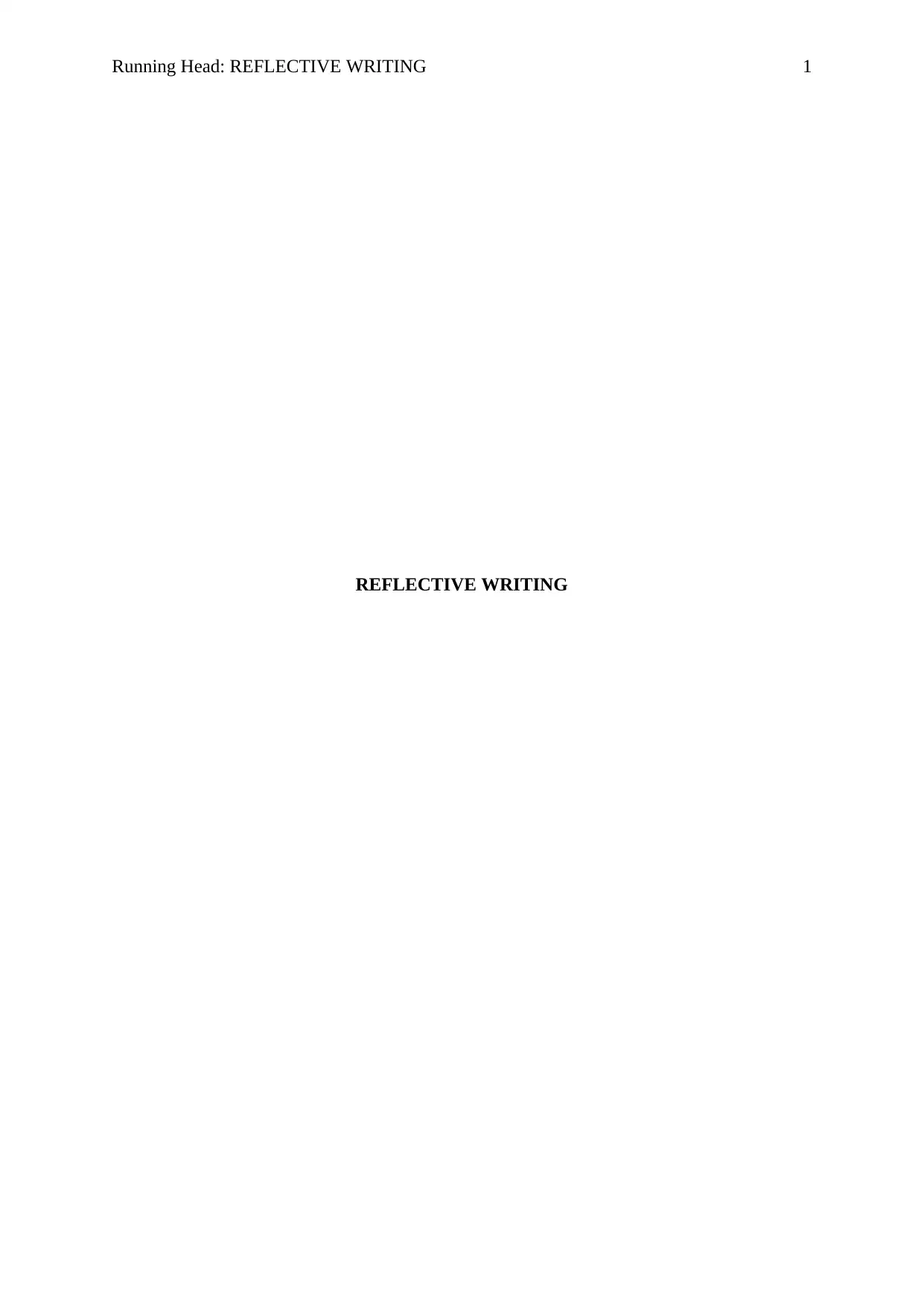
Running Head: REFLECTIVE WRITING 1
REFLECTIVE WRITING
REFLECTIVE WRITING
Secure Best Marks with AI Grader
Need help grading? Try our AI Grader for instant feedback on your assignments.
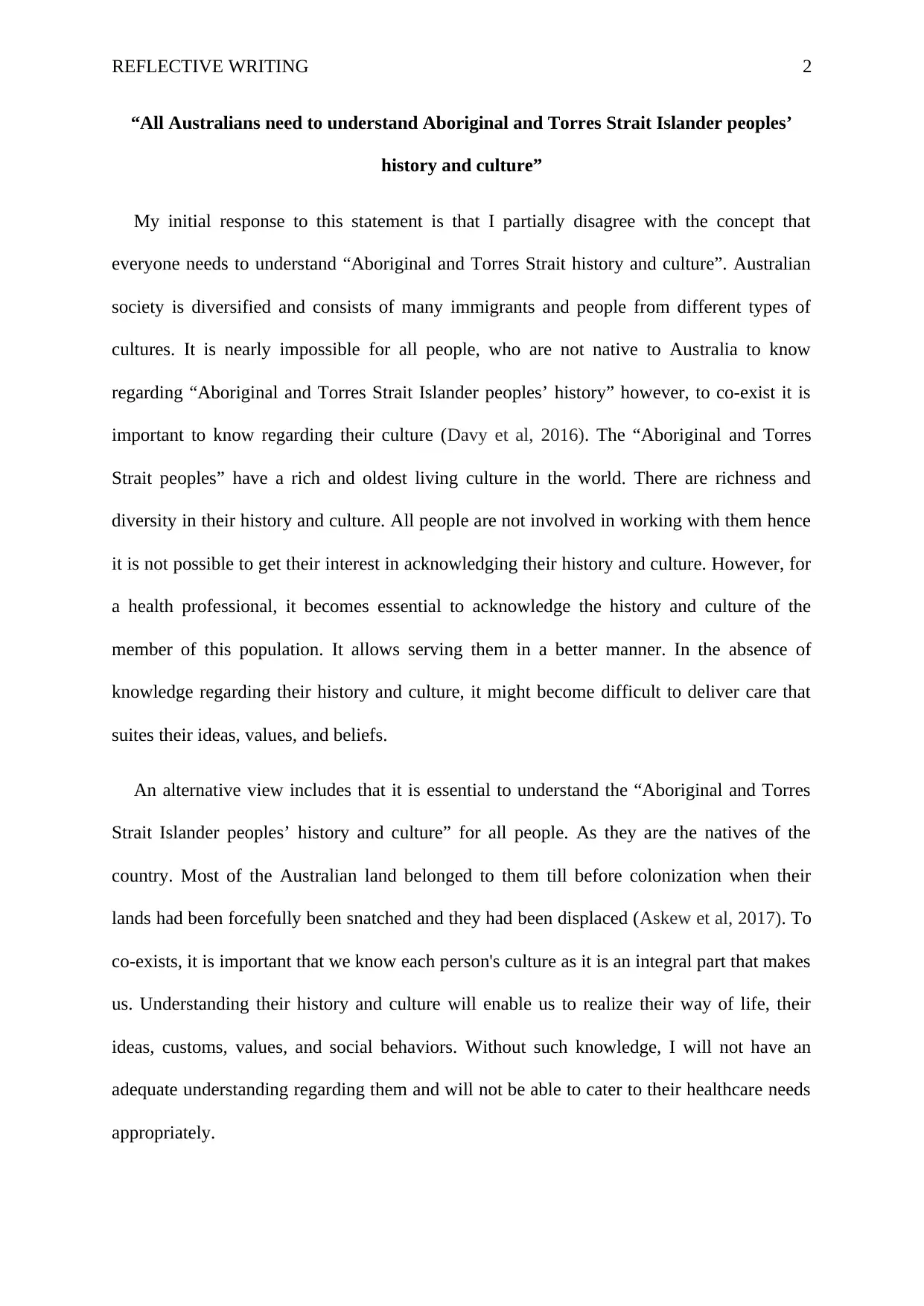
REFLECTIVE WRITING 2
“All Australians need to understand Aboriginal and Torres Strait Islander peoples’
history and culture”
My initial response to this statement is that I partially disagree with the concept that
everyone needs to understand “Aboriginal and Torres Strait history and culture”. Australian
society is diversified and consists of many immigrants and people from different types of
cultures. It is nearly impossible for all people, who are not native to Australia to know
regarding “Aboriginal and Torres Strait Islander peoples’ history” however, to co-exist it is
important to know regarding their culture (Davy et al, 2016). The “Aboriginal and Torres
Strait peoples” have a rich and oldest living culture in the world. There are richness and
diversity in their history and culture. All people are not involved in working with them hence
it is not possible to get their interest in acknowledging their history and culture. However, for
a health professional, it becomes essential to acknowledge the history and culture of the
member of this population. It allows serving them in a better manner. In the absence of
knowledge regarding their history and culture, it might become difficult to deliver care that
suites their ideas, values, and beliefs.
An alternative view includes that it is essential to understand the “Aboriginal and Torres
Strait Islander peoples’ history and culture” for all people. As they are the natives of the
country. Most of the Australian land belonged to them till before colonization when their
lands had been forcefully been snatched and they had been displaced (Askew et al, 2017). To
co-exists, it is important that we know each person's culture as it is an integral part that makes
us. Understanding their history and culture will enable us to realize their way of life, their
ideas, customs, values, and social behaviors. Without such knowledge, I will not have an
adequate understanding regarding them and will not be able to cater to their healthcare needs
appropriately.
“All Australians need to understand Aboriginal and Torres Strait Islander peoples’
history and culture”
My initial response to this statement is that I partially disagree with the concept that
everyone needs to understand “Aboriginal and Torres Strait history and culture”. Australian
society is diversified and consists of many immigrants and people from different types of
cultures. It is nearly impossible for all people, who are not native to Australia to know
regarding “Aboriginal and Torres Strait Islander peoples’ history” however, to co-exist it is
important to know regarding their culture (Davy et al, 2016). The “Aboriginal and Torres
Strait peoples” have a rich and oldest living culture in the world. There are richness and
diversity in their history and culture. All people are not involved in working with them hence
it is not possible to get their interest in acknowledging their history and culture. However, for
a health professional, it becomes essential to acknowledge the history and culture of the
member of this population. It allows serving them in a better manner. In the absence of
knowledge regarding their history and culture, it might become difficult to deliver care that
suites their ideas, values, and beliefs.
An alternative view includes that it is essential to understand the “Aboriginal and Torres
Strait Islander peoples’ history and culture” for all people. As they are the natives of the
country. Most of the Australian land belonged to them till before colonization when their
lands had been forcefully been snatched and they had been displaced (Askew et al, 2017). To
co-exists, it is important that we know each person's culture as it is an integral part that makes
us. Understanding their history and culture will enable us to realize their way of life, their
ideas, customs, values, and social behaviors. Without such knowledge, I will not have an
adequate understanding regarding them and will not be able to cater to their healthcare needs
appropriately.
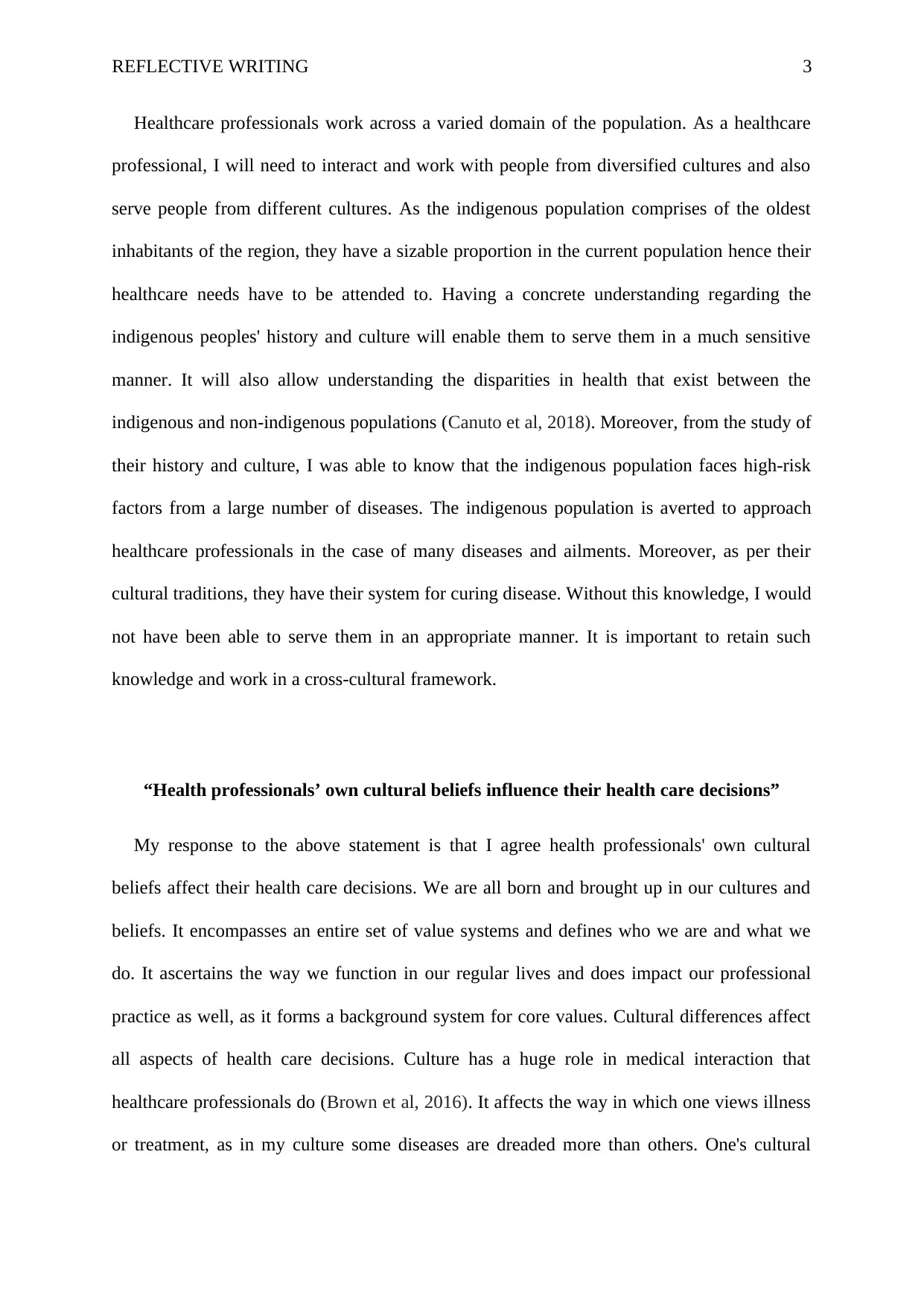
REFLECTIVE WRITING 3
Healthcare professionals work across a varied domain of the population. As a healthcare
professional, I will need to interact and work with people from diversified cultures and also
serve people from different cultures. As the indigenous population comprises of the oldest
inhabitants of the region, they have a sizable proportion in the current population hence their
healthcare needs have to be attended to. Having a concrete understanding regarding the
indigenous peoples' history and culture will enable them to serve them in a much sensitive
manner. It will also allow understanding the disparities in health that exist between the
indigenous and non-indigenous populations (Canuto et al, 2018). Moreover, from the study of
their history and culture, I was able to know that the indigenous population faces high-risk
factors from a large number of diseases. The indigenous population is averted to approach
healthcare professionals in the case of many diseases and ailments. Moreover, as per their
cultural traditions, they have their system for curing disease. Without this knowledge, I would
not have been able to serve them in an appropriate manner. It is important to retain such
knowledge and work in a cross-cultural framework.
“Health professionals’ own cultural beliefs influence their health care decisions”
My response to the above statement is that I agree health professionals' own cultural
beliefs affect their health care decisions. We are all born and brought up in our cultures and
beliefs. It encompasses an entire set of value systems and defines who we are and what we
do. It ascertains the way we function in our regular lives and does impact our professional
practice as well, as it forms a background system for core values. Cultural differences affect
all aspects of health care decisions. Culture has a huge role in medical interaction that
healthcare professionals do (Brown et al, 2016). It affects the way in which one views illness
or treatment, as in my culture some diseases are dreaded more than others. One's cultural
Healthcare professionals work across a varied domain of the population. As a healthcare
professional, I will need to interact and work with people from diversified cultures and also
serve people from different cultures. As the indigenous population comprises of the oldest
inhabitants of the region, they have a sizable proportion in the current population hence their
healthcare needs have to be attended to. Having a concrete understanding regarding the
indigenous peoples' history and culture will enable them to serve them in a much sensitive
manner. It will also allow understanding the disparities in health that exist between the
indigenous and non-indigenous populations (Canuto et al, 2018). Moreover, from the study of
their history and culture, I was able to know that the indigenous population faces high-risk
factors from a large number of diseases. The indigenous population is averted to approach
healthcare professionals in the case of many diseases and ailments. Moreover, as per their
cultural traditions, they have their system for curing disease. Without this knowledge, I would
not have been able to serve them in an appropriate manner. It is important to retain such
knowledge and work in a cross-cultural framework.
“Health professionals’ own cultural beliefs influence their health care decisions”
My response to the above statement is that I agree health professionals' own cultural
beliefs affect their health care decisions. We are all born and brought up in our cultures and
beliefs. It encompasses an entire set of value systems and defines who we are and what we
do. It ascertains the way we function in our regular lives and does impact our professional
practice as well, as it forms a background system for core values. Cultural differences affect
all aspects of health care decisions. Culture has a huge role in medical interaction that
healthcare professionals do (Brown et al, 2016). It affects the way in which one views illness
or treatment, as in my culture some diseases are dreaded more than others. One's cultural
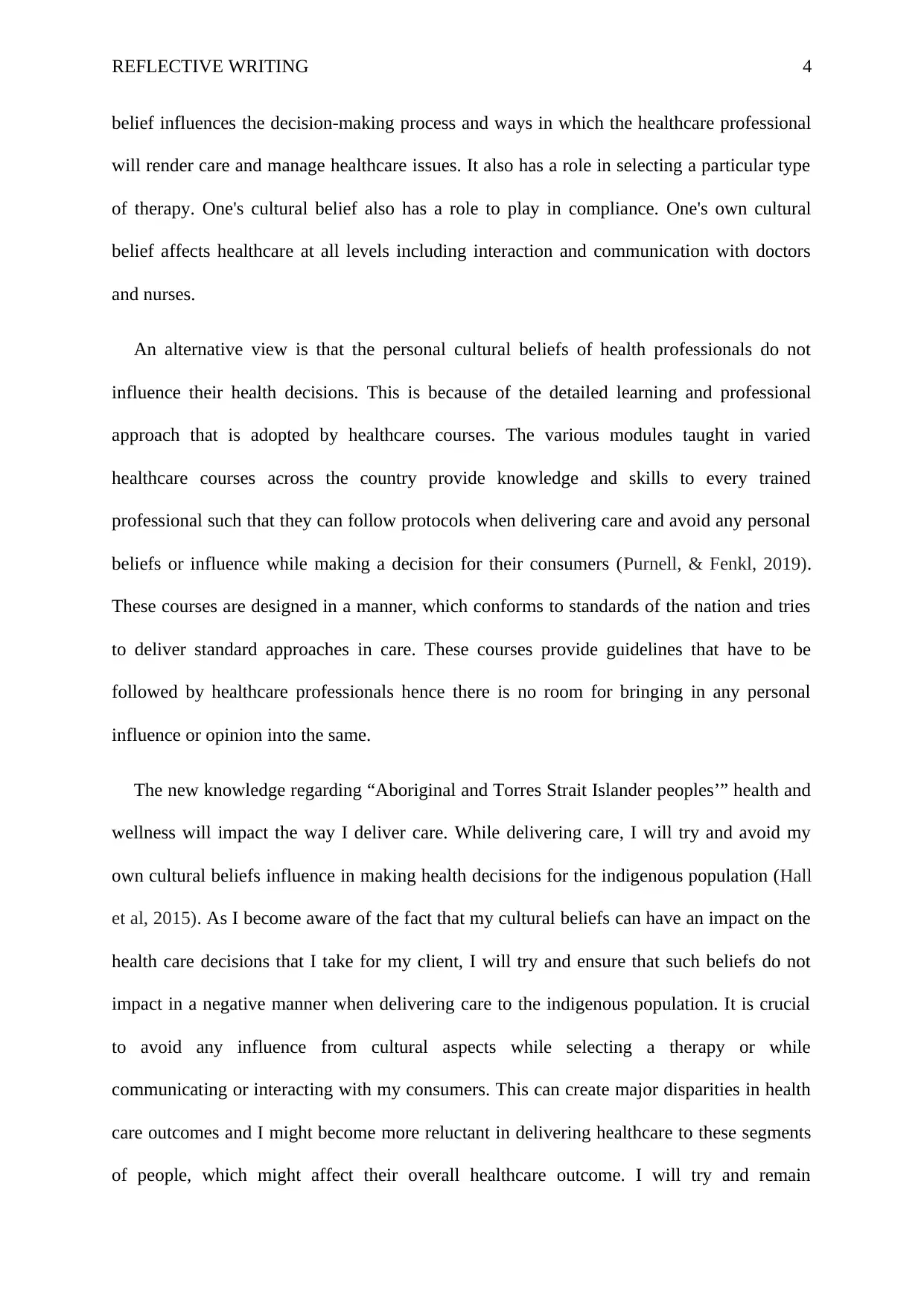
REFLECTIVE WRITING 4
belief influences the decision-making process and ways in which the healthcare professional
will render care and manage healthcare issues. It also has a role in selecting a particular type
of therapy. One's cultural belief also has a role to play in compliance. One's own cultural
belief affects healthcare at all levels including interaction and communication with doctors
and nurses.
An alternative view is that the personal cultural beliefs of health professionals do not
influence their health decisions. This is because of the detailed learning and professional
approach that is adopted by healthcare courses. The various modules taught in varied
healthcare courses across the country provide knowledge and skills to every trained
professional such that they can follow protocols when delivering care and avoid any personal
beliefs or influence while making a decision for their consumers (Purnell, & Fenkl, 2019).
These courses are designed in a manner, which conforms to standards of the nation and tries
to deliver standard approaches in care. These courses provide guidelines that have to be
followed by healthcare professionals hence there is no room for bringing in any personal
influence or opinion into the same.
The new knowledge regarding “Aboriginal and Torres Strait Islander peoples’” health and
wellness will impact the way I deliver care. While delivering care, I will try and avoid my
own cultural beliefs influence in making health decisions for the indigenous population (Hall
et al, 2015). As I become aware of the fact that my cultural beliefs can have an impact on the
health care decisions that I take for my client, I will try and ensure that such beliefs do not
impact in a negative manner when delivering care to the indigenous population. It is crucial
to avoid any influence from cultural aspects while selecting a therapy or while
communicating or interacting with my consumers. This can create major disparities in health
care outcomes and I might become more reluctant in delivering healthcare to these segments
of people, which might affect their overall healthcare outcome. I will try and remain
belief influences the decision-making process and ways in which the healthcare professional
will render care and manage healthcare issues. It also has a role in selecting a particular type
of therapy. One's cultural belief also has a role to play in compliance. One's own cultural
belief affects healthcare at all levels including interaction and communication with doctors
and nurses.
An alternative view is that the personal cultural beliefs of health professionals do not
influence their health decisions. This is because of the detailed learning and professional
approach that is adopted by healthcare courses. The various modules taught in varied
healthcare courses across the country provide knowledge and skills to every trained
professional such that they can follow protocols when delivering care and avoid any personal
beliefs or influence while making a decision for their consumers (Purnell, & Fenkl, 2019).
These courses are designed in a manner, which conforms to standards of the nation and tries
to deliver standard approaches in care. These courses provide guidelines that have to be
followed by healthcare professionals hence there is no room for bringing in any personal
influence or opinion into the same.
The new knowledge regarding “Aboriginal and Torres Strait Islander peoples’” health and
wellness will impact the way I deliver care. While delivering care, I will try and avoid my
own cultural beliefs influence in making health decisions for the indigenous population (Hall
et al, 2015). As I become aware of the fact that my cultural beliefs can have an impact on the
health care decisions that I take for my client, I will try and ensure that such beliefs do not
impact in a negative manner when delivering care to the indigenous population. It is crucial
to avoid any influence from cultural aspects while selecting a therapy or while
communicating or interacting with my consumers. This can create major disparities in health
care outcomes and I might become more reluctant in delivering healthcare to these segments
of people, which might affect their overall healthcare outcome. I will try and remain
Secure Best Marks with AI Grader
Need help grading? Try our AI Grader for instant feedback on your assignments.
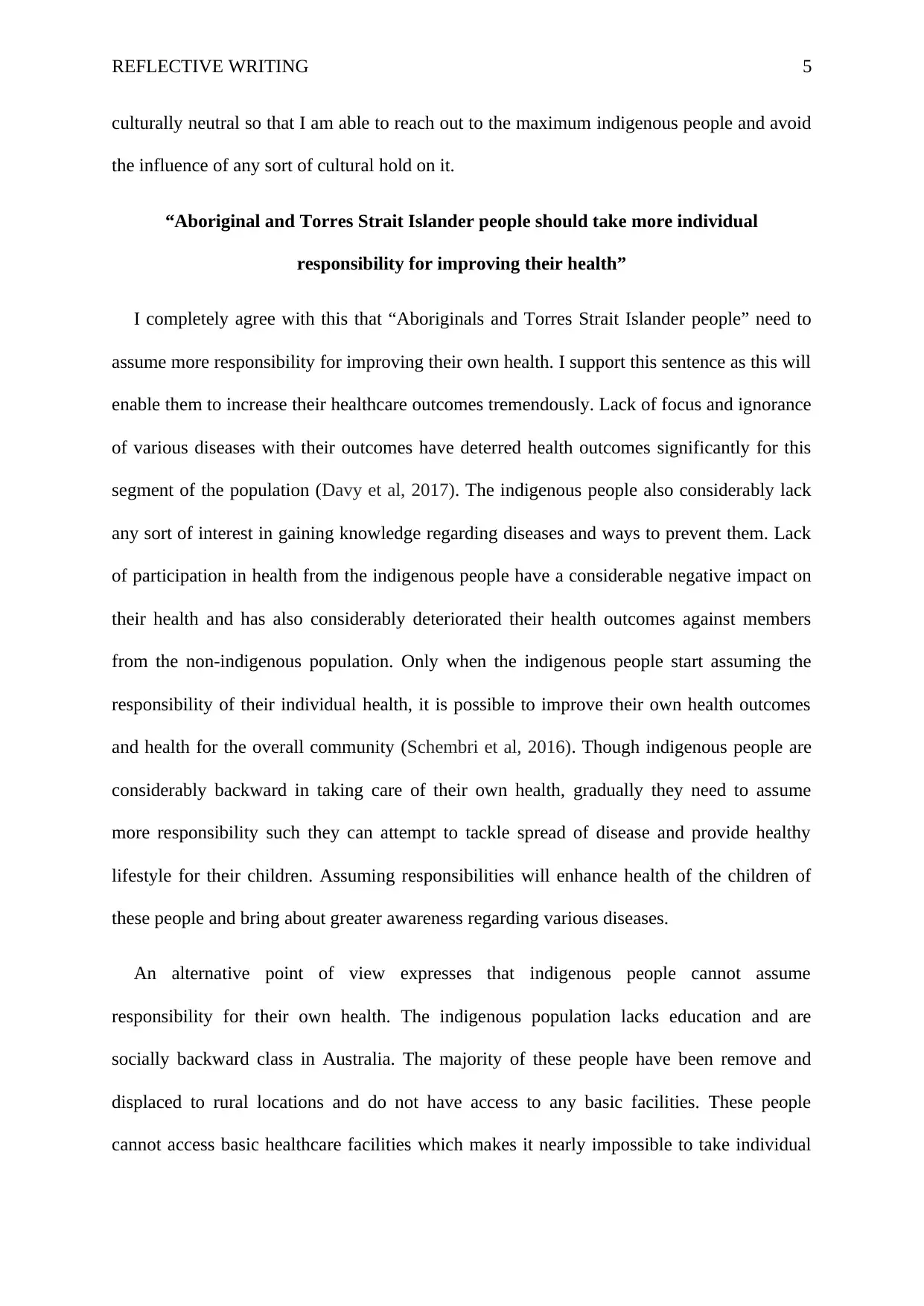
REFLECTIVE WRITING 5
culturally neutral so that I am able to reach out to the maximum indigenous people and avoid
the influence of any sort of cultural hold on it.
“Aboriginal and Torres Strait Islander people should take more individual
responsibility for improving their health”
I completely agree with this that “Aboriginals and Torres Strait Islander people” need to
assume more responsibility for improving their own health. I support this sentence as this will
enable them to increase their healthcare outcomes tremendously. Lack of focus and ignorance
of various diseases with their outcomes have deterred health outcomes significantly for this
segment of the population (Davy et al, 2017). The indigenous people also considerably lack
any sort of interest in gaining knowledge regarding diseases and ways to prevent them. Lack
of participation in health from the indigenous people have a considerable negative impact on
their health and has also considerably deteriorated their health outcomes against members
from the non-indigenous population. Only when the indigenous people start assuming the
responsibility of their individual health, it is possible to improve their own health outcomes
and health for the overall community (Schembri et al, 2016). Though indigenous people are
considerably backward in taking care of their own health, gradually they need to assume
more responsibility such they can attempt to tackle spread of disease and provide healthy
lifestyle for their children. Assuming responsibilities will enhance health of the children of
these people and bring about greater awareness regarding various diseases.
An alternative point of view expresses that indigenous people cannot assume
responsibility for their own health. The indigenous population lacks education and are
socially backward class in Australia. The majority of these people have been remove and
displaced to rural locations and do not have access to any basic facilities. These people
cannot access basic healthcare facilities which makes it nearly impossible to take individual
culturally neutral so that I am able to reach out to the maximum indigenous people and avoid
the influence of any sort of cultural hold on it.
“Aboriginal and Torres Strait Islander people should take more individual
responsibility for improving their health”
I completely agree with this that “Aboriginals and Torres Strait Islander people” need to
assume more responsibility for improving their own health. I support this sentence as this will
enable them to increase their healthcare outcomes tremendously. Lack of focus and ignorance
of various diseases with their outcomes have deterred health outcomes significantly for this
segment of the population (Davy et al, 2017). The indigenous people also considerably lack
any sort of interest in gaining knowledge regarding diseases and ways to prevent them. Lack
of participation in health from the indigenous people have a considerable negative impact on
their health and has also considerably deteriorated their health outcomes against members
from the non-indigenous population. Only when the indigenous people start assuming the
responsibility of their individual health, it is possible to improve their own health outcomes
and health for the overall community (Schembri et al, 2016). Though indigenous people are
considerably backward in taking care of their own health, gradually they need to assume
more responsibility such they can attempt to tackle spread of disease and provide healthy
lifestyle for their children. Assuming responsibilities will enhance health of the children of
these people and bring about greater awareness regarding various diseases.
An alternative point of view expresses that indigenous people cannot assume
responsibility for their own health. The indigenous population lacks education and are
socially backward class in Australia. The majority of these people have been remove and
displaced to rural locations and do not have access to any basic facilities. These people
cannot access basic healthcare facilities which makes it nearly impossible to take individual
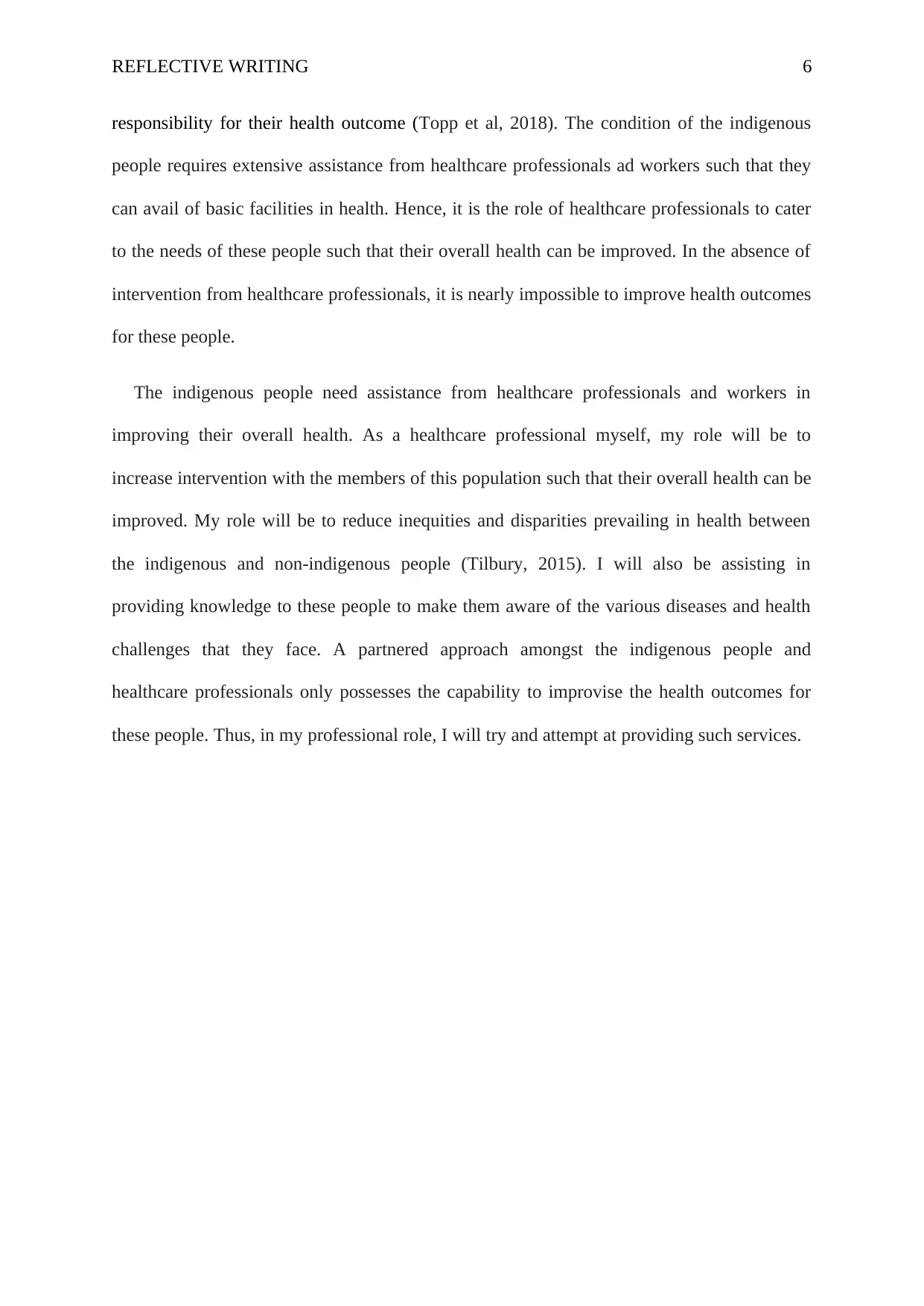
REFLECTIVE WRITING 6
responsibility for their health outcome (Topp et al, 2018). The condition of the indigenous
people requires extensive assistance from healthcare professionals ad workers such that they
can avail of basic facilities in health. Hence, it is the role of healthcare professionals to cater
to the needs of these people such that their overall health can be improved. In the absence of
intervention from healthcare professionals, it is nearly impossible to improve health outcomes
for these people.
The indigenous people need assistance from healthcare professionals and workers in
improving their overall health. As a healthcare professional myself, my role will be to
increase intervention with the members of this population such that their overall health can be
improved. My role will be to reduce inequities and disparities prevailing in health between
the indigenous and non-indigenous people (Tilbury, 2015). I will also be assisting in
providing knowledge to these people to make them aware of the various diseases and health
challenges that they face. A partnered approach amongst the indigenous people and
healthcare professionals only possesses the capability to improvise the health outcomes for
these people. Thus, in my professional role, I will try and attempt at providing such services.
responsibility for their health outcome (Topp et al, 2018). The condition of the indigenous
people requires extensive assistance from healthcare professionals ad workers such that they
can avail of basic facilities in health. Hence, it is the role of healthcare professionals to cater
to the needs of these people such that their overall health can be improved. In the absence of
intervention from healthcare professionals, it is nearly impossible to improve health outcomes
for these people.
The indigenous people need assistance from healthcare professionals and workers in
improving their overall health. As a healthcare professional myself, my role will be to
increase intervention with the members of this population such that their overall health can be
improved. My role will be to reduce inequities and disparities prevailing in health between
the indigenous and non-indigenous people (Tilbury, 2015). I will also be assisting in
providing knowledge to these people to make them aware of the various diseases and health
challenges that they face. A partnered approach amongst the indigenous people and
healthcare professionals only possesses the capability to improvise the health outcomes for
these people. Thus, in my professional role, I will try and attempt at providing such services.
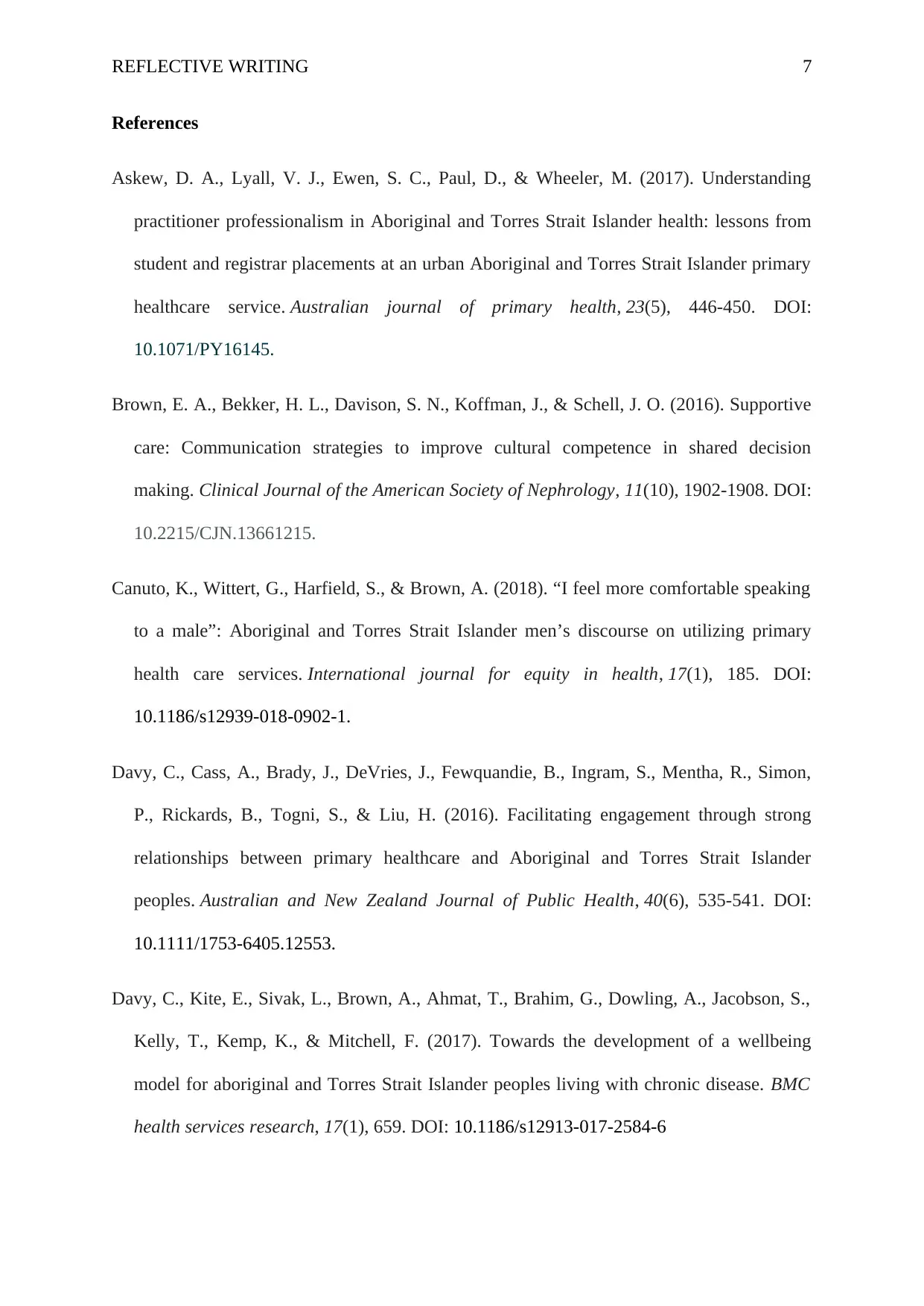
REFLECTIVE WRITING 7
References
Askew, D. A., Lyall, V. J., Ewen, S. C., Paul, D., & Wheeler, M. (2017). Understanding
practitioner professionalism in Aboriginal and Torres Strait Islander health: lessons from
student and registrar placements at an urban Aboriginal and Torres Strait Islander primary
healthcare service. Australian journal of primary health, 23(5), 446-450. DOI:
10.1071/PY16145.
Brown, E. A., Bekker, H. L., Davison, S. N., Koffman, J., & Schell, J. O. (2016). Supportive
care: Communication strategies to improve cultural competence in shared decision
making. Clinical Journal of the American Society of Nephrology, 11(10), 1902-1908. DOI:
10.2215/CJN.13661215.
Canuto, K., Wittert, G., Harfield, S., & Brown, A. (2018). “I feel more comfortable speaking
to a male”: Aboriginal and Torres Strait Islander men’s discourse on utilizing primary
health care services. International journal for equity in health, 17(1), 185. DOI:
10.1186/s12939-018-0902-1.
Davy, C., Cass, A., Brady, J., DeVries, J., Fewquandie, B., Ingram, S., Mentha, R., Simon,
P., Rickards, B., Togni, S., & Liu, H. (2016). Facilitating engagement through strong
relationships between primary healthcare and Aboriginal and Torres Strait Islander
peoples. Australian and New Zealand Journal of Public Health, 40(6), 535-541. DOI:
10.1111/1753-6405.12553.
Davy, C., Kite, E., Sivak, L., Brown, A., Ahmat, T., Brahim, G., Dowling, A., Jacobson, S.,
Kelly, T., Kemp, K., & Mitchell, F. (2017). Towards the development of a wellbeing
model for aboriginal and Torres Strait Islander peoples living with chronic disease. BMC
health services research, 17(1), 659. DOI: 10.1186/s12913-017-2584-6
References
Askew, D. A., Lyall, V. J., Ewen, S. C., Paul, D., & Wheeler, M. (2017). Understanding
practitioner professionalism in Aboriginal and Torres Strait Islander health: lessons from
student and registrar placements at an urban Aboriginal and Torres Strait Islander primary
healthcare service. Australian journal of primary health, 23(5), 446-450. DOI:
10.1071/PY16145.
Brown, E. A., Bekker, H. L., Davison, S. N., Koffman, J., & Schell, J. O. (2016). Supportive
care: Communication strategies to improve cultural competence in shared decision
making. Clinical Journal of the American Society of Nephrology, 11(10), 1902-1908. DOI:
10.2215/CJN.13661215.
Canuto, K., Wittert, G., Harfield, S., & Brown, A. (2018). “I feel more comfortable speaking
to a male”: Aboriginal and Torres Strait Islander men’s discourse on utilizing primary
health care services. International journal for equity in health, 17(1), 185. DOI:
10.1186/s12939-018-0902-1.
Davy, C., Cass, A., Brady, J., DeVries, J., Fewquandie, B., Ingram, S., Mentha, R., Simon,
P., Rickards, B., Togni, S., & Liu, H. (2016). Facilitating engagement through strong
relationships between primary healthcare and Aboriginal and Torres Strait Islander
peoples. Australian and New Zealand Journal of Public Health, 40(6), 535-541. DOI:
10.1111/1753-6405.12553.
Davy, C., Kite, E., Sivak, L., Brown, A., Ahmat, T., Brahim, G., Dowling, A., Jacobson, S.,
Kelly, T., Kemp, K., & Mitchell, F. (2017). Towards the development of a wellbeing
model for aboriginal and Torres Strait Islander peoples living with chronic disease. BMC
health services research, 17(1), 659. DOI: 10.1186/s12913-017-2584-6
Paraphrase This Document
Need a fresh take? Get an instant paraphrase of this document with our AI Paraphraser
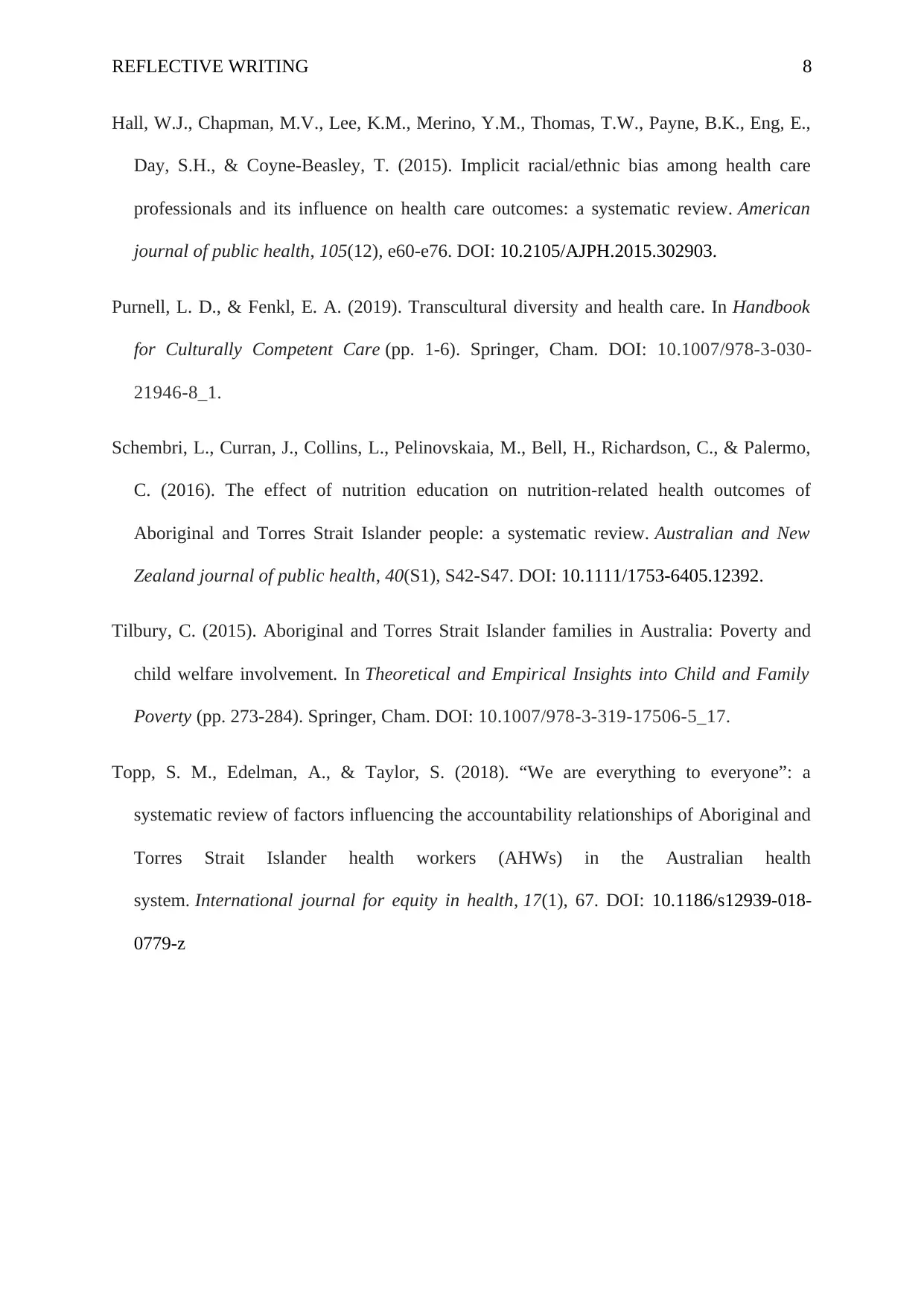
REFLECTIVE WRITING 8
Hall, W.J., Chapman, M.V., Lee, K.M., Merino, Y.M., Thomas, T.W., Payne, B.K., Eng, E.,
Day, S.H., & Coyne-Beasley, T. (2015). Implicit racial/ethnic bias among health care
professionals and its influence on health care outcomes: a systematic review. American
journal of public health, 105(12), e60-e76. DOI: 10.2105/AJPH.2015.302903.
Purnell, L. D., & Fenkl, E. A. (2019). Transcultural diversity and health care. In Handbook
for Culturally Competent Care (pp. 1-6). Springer, Cham. DOI: 10.1007/978-3-030-
21946-8_1.
Schembri, L., Curran, J., Collins, L., Pelinovskaia, M., Bell, H., Richardson, C., & Palermo,
C. (2016). The effect of nutrition education on nutrition‐related health outcomes of
Aboriginal and Torres Strait Islander people: a systematic review. Australian and New
Zealand journal of public health, 40(S1), S42-S47. DOI: 10.1111/1753-6405.12392.
Tilbury, C. (2015). Aboriginal and Torres Strait Islander families in Australia: Poverty and
child welfare involvement. In Theoretical and Empirical Insights into Child and Family
Poverty (pp. 273-284). Springer, Cham. DOI: 10.1007/978-3-319-17506-5_17.
Topp, S. M., Edelman, A., & Taylor, S. (2018). “We are everything to everyone”: a
systematic review of factors influencing the accountability relationships of Aboriginal and
Torres Strait Islander health workers (AHWs) in the Australian health
system. International journal for equity in health, 17(1), 67. DOI: 10.1186/s12939-018-
0779-z
Hall, W.J., Chapman, M.V., Lee, K.M., Merino, Y.M., Thomas, T.W., Payne, B.K., Eng, E.,
Day, S.H., & Coyne-Beasley, T. (2015). Implicit racial/ethnic bias among health care
professionals and its influence on health care outcomes: a systematic review. American
journal of public health, 105(12), e60-e76. DOI: 10.2105/AJPH.2015.302903.
Purnell, L. D., & Fenkl, E. A. (2019). Transcultural diversity and health care. In Handbook
for Culturally Competent Care (pp. 1-6). Springer, Cham. DOI: 10.1007/978-3-030-
21946-8_1.
Schembri, L., Curran, J., Collins, L., Pelinovskaia, M., Bell, H., Richardson, C., & Palermo,
C. (2016). The effect of nutrition education on nutrition‐related health outcomes of
Aboriginal and Torres Strait Islander people: a systematic review. Australian and New
Zealand journal of public health, 40(S1), S42-S47. DOI: 10.1111/1753-6405.12392.
Tilbury, C. (2015). Aboriginal and Torres Strait Islander families in Australia: Poverty and
child welfare involvement. In Theoretical and Empirical Insights into Child and Family
Poverty (pp. 273-284). Springer, Cham. DOI: 10.1007/978-3-319-17506-5_17.
Topp, S. M., Edelman, A., & Taylor, S. (2018). “We are everything to everyone”: a
systematic review of factors influencing the accountability relationships of Aboriginal and
Torres Strait Islander health workers (AHWs) in the Australian health
system. International journal for equity in health, 17(1), 67. DOI: 10.1186/s12939-018-
0779-z
1 out of 8
Related Documents
Your All-in-One AI-Powered Toolkit for Academic Success.
+13062052269
info@desklib.com
Available 24*7 on WhatsApp / Email
![[object Object]](/_next/static/media/star-bottom.7253800d.svg)
Unlock your academic potential
© 2024 | Zucol Services PVT LTD | All rights reserved.





